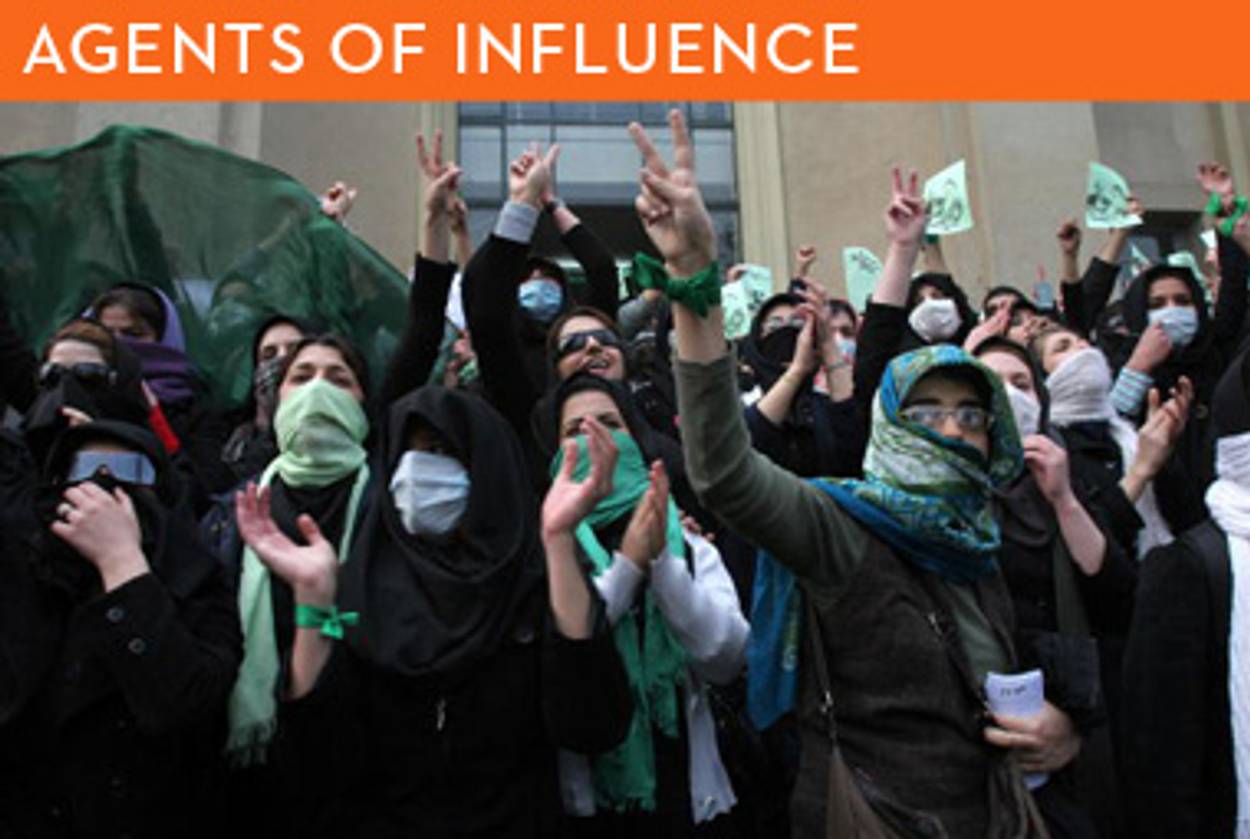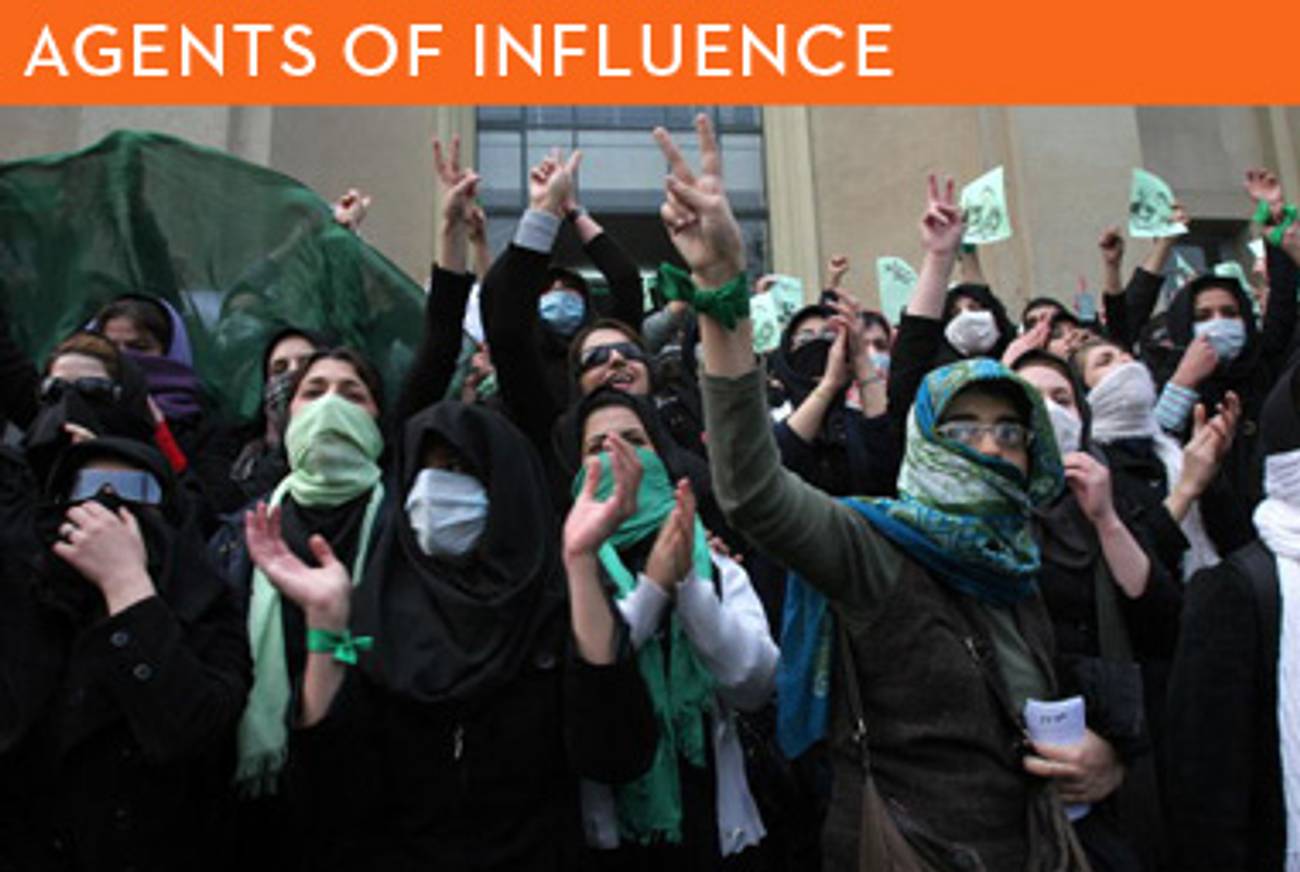Unlikely Revolutionaries
How a former Iranian official and a U.S. foreign-policy guru are shifting Washington’s stance toward regime change in Tehran




Mohsen Sazegara is sipping tea at Starbucks to ease his flu. The temperature is below freezing in Georgetown, and the 55-year-old Iranian-rights activist has his sweater buttoned up to his chin. A compact and balding man in glasses, Sazegara came to Washington four years ago for heart surgery after undergoing an eye operation in London to repair the damage done to his body during a hunger strike he started after he was arrested by Iran’s Intelligence Ministry in 2003. Now, he’s at the center of the cyberwar against the Khamenei regime in Tehran.
Despite his professorial appearance, Sazegara is one of the most important figures influencing U.S. policy toward Iran, a central player in the campaign of street protests that took official Washington by surprise and have increasingly been embraced by the “realist” foreign policy establishment as the West’s only hope of reducing the threat posed by an Iranian government intent on developing a nuclear bomb. His website, at Sazegara.net, is a virtual command center for Iranians who are risking their lives to confront the regime. The site, which gets up to 40,000 visits in a day, has been subject to repeated cyber-attack by the regime. It features daily videoblogs in Persian that provide analysis of recent events and answer questions coming in from the field, like “the security forces are tear-gassing us, how do we handle it?”
“He’s extremely active and plays a part in the day-to-day changes in Iran,” says Roya Hakakian, author of Journey From the Land of No: A Girlhood Caught in Revolutionary Iran. “This is unusual for an opposition leader in exile. The regime knows that they are generally neutralized when they leave, but Mohsen is unique, still reaching out to people in Iran.”
Sazegara’s credibility goes back to the foundations of the Islamic Republic and his proximity to its founding father, Ayatollah Ruhollah Khomeini. “At the beginning, I believed in the regime’s revolutionary ideology of Islam, like the majority of Iranians,” says Sazegara. “In 1979, I was in Paris with Ayatollah Khomeini and returned to Iran with him on the same flight.” Sazegara was so far inside the regime’s inner circle that he helped to found one of the Islamic Republic’s most notorious institutions, the Revolutionary Guard. The nascent revolution that is gathering strength in the streets of Tehran today is not spontaneous, he says, but is the result of two decades of dissatisfaction and disenchantment.
The political transformation in Tehran is matched by a similar revolution in consciousness on the part of the realist foreign policy establishment in Washington. If Sazegara is one of the leaders of the movement that is shaking the Iranian regime, the realists in Washington are led by Richard Haass, the current president of the Council on Foreign Relations—who opposed the Bush administration’s Iran policy as too aggressive and famously argued that the US had no interest in throwing Saddam Hussein out of Kuwait during the first Gulf War.
While neither man is a household name, the fact is that the policymaking process in Washington can be as inscrutable to outsiders as the inner workings of Iran’s famously opaque clerical regime. Public figures like Secretary of State Hillary Clinton or James Jones, the national security adviser, are simply the most visible members of a broad circle of policymakers who cross the aisle just as frequently as they stick to partisan prejudices, and who speak to each other through private channels, thinktanks, and the media.
Haass’ influence on the tone of foreign policy discourse in Obama’s 2008 campaign and on the staffing of the State Department and White House makes him perhaps the most influential foreign policy expert in Washington who is not a member of the Obama administration. The fact that the tone-setter of much of Obama’s public discourse about foreign policy has now become a proponent of “regime change”—the phrase associated with George W. Bush’s brazen invasion of Iraq—is enough to make any observer do a double take. During the reign of the neoconservatives in Washington, Haass and the realists delighted in savaging the Bush administration’s miscues and recommended a return to a more pragmatic foreign policy. Haass even invited Iranian president Mahmoud Ahmadinejad to address the Council in a controversial 2006 session, paving the way for candidate Barack Obama’s campaign promise that he would talk to anyone, especially the Islamic Republic of Iran.
However, now more than a year into Obama’s term, the engagement with Tehran that Haass and the realists wanted has led nowhere. Moreover, the anti-government demonstrations taking place throughout Iran have not abated, as some had prophesied in June.
With more protests expected for the 31st anniversary of the revolution on February 11, it seems the realists are now jumping off the “engagement with Iran” bandwagon. “The nuclear talks are going nowhere,” Haass wrote in a January issue of Newsweek. Instead, he argued:
we should be focusing on another fact: Iran may be closer to profound political change than at any time since the revolution that ousted the shah 30 years ago…. Outsiders should act to strengthen the opposition and to deepen rifts among the rulers. This process is underway, and while it will take time, it promises the first good chance in decades to bring about an Iran that, even if less than a model country, would nonetheless act considerably better at home and abroad. Even a realist should recognize that it’s an opportunity not to be missed.
If some in the realist camp, like Israel Lobby author Stephen Walt, were appalled by Haass’ conversion, the neoconservatives welcomed it. “I hope his many minions will follow his lead,” says Michael Rubin, a resident scholar at the American Enterprise Institute who worked in the Pentagon during the George W. Bush administration. “And that the disruptions they’ve caused in preventing us from creating an effective Iran policy will end as will their fantasy that Iran is a regime like any other.”
“I think it’s terrific,” says Michael Ledeen, at the Foundation for the Defense of Democracies, who has distinguished himself as one of the few in the capital who has argued that the opposition was able, or willing, to bring down the Iranian regime. “Richard had an awful lot invested in making a deal with the regime, so I take my hat off to him for saying I changed my mind.”
The more cynical reading of Haass’ conversion is that the embrace of regime change in Iran through a revolution in the streets—that the United States will support in theory, but do nothing practical to advance—is really an effort to block the Israelis from taking military action to destroy the Iranian nuclear program. “It struck me that Richard was running this idea up a flagpole for the administration, or maybe for someone in the administration,” says a former senior official in the George W. Bush White House. “Maybe it’s Dennis Ross, who’s toyed around with some of these ideas before. Who knows? Richard’s not usually someone this far out in front on stuff. This suggests to me the administration is moving closer to formulating an Iran policy now that engagement has failed.”
There is evidence to support the idea that the American foreign policy establishment believes stopping Israel from attacking Iran is a key goal of U.S. Middle East policy. At a late November war game simulating the confrontation over Iran’s nuclear program, Nicholas Burns, the former undersecretary of State played President Barack Obama. “The most difficult problem we have is how to restrain Israel,” said Burns. “We need to play for a long-term solution, avoid a third war in the greater Middle East and wear down the Iranians over time.”
It therefore appears that we are entering the final act of a shadow play that is ostensibly about the Iranian nuclear program but is in fact about regional hegemony and who gets to set the agenda in the oil-rich, and strategically vital, Middle East. The Bush administration’s martial posture and the Obama White House’s engagement have shown that the Americans are incapable of directly shaping Iran’s strategy, whether by threats or finesse. The United States must therefore find a way to leverage the two remaining instruments at its disposal—an Israeli ally that menaces Iran and an opposition movement that means to bring the Tehran regime to its knees—in the hope of creating the necessary pressure for negotiations that the Iranians clearly don’t want but might be forced to embrace as the least-bad of available options.
If Haass’ article does indeed represent the views of influential members of the Obama administration, Washington may be about to stake its position in the Middle East on the ability of Mohsen Sazegara and his colleagues to turn a revolution on its head. Yet if the balance of threats from above (Israel) and below (the Iranian street) is not managed deftly, the Obama administration will find its assets are at cross-purposes. The bomb is a regime-saver, for there are few Iranians who do not believe that the proud and ancient Persian civilization merits the badge of technological prowess that a nuclear program represents. The easiest way for the Iranian regime to restore its battered credibility with its own people may be to ignore external pressure and work even harder to develop a bomb. By removing the threat of an Israeli attack, Obama gives Iran the time to acquire the bomb and with it the credentials to corral its domestic adversaries and cement its aggressive position at home and abroad.
CORRECTION, Feb. 9: An earlier version of this article said that February 11 would mark the 30th anniversary of the Iranian revolution. In fact, it will be the 31st anniversary of the revolution, which happened in 1979.
Lee Smith is the author of The Consequences of Syria.
Lee Smith is the author of The Permanent Coup: How Enemies Foreign and Domestic Targeted the American President (2020).